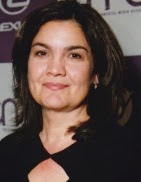The 2015 Season of Rough Readings is now in full swing for the Winter and Spring seasons! Continuing over the next few months, we will be presenting audiences with up-close and personal readings of new plays in early draft form. Read more about Erin Bregman, The Lady Onstage, and the Rough Reading series at playwrightsfoundation.org
The March Rough Reading features The Lady Onstage, a new work by Erin Bregman. We were able to ask her a few questions about her work -- read on below!
Rachel Finkelstein: Thank you for speaking with me! To start off, I'd love to hear about what drew you to write about Olga Knipper.
 |
| Erin Bregman |
Erin Bregman: Actually, it was something that Graham [The Lady Onstage director M. Graham Smith] and Lauren [The Lady Onstage performer Lauren Bloom*] had been working on for a couple of years before they asked me to get involved. I jumped in mostly because I love Graham as a director, and totally trusted anything he would set out to create. But, I had never heard of Olga Knipper before starting this project. This is my first time working with Lauren, and it's been a blast, and have felt very lucky at every step that they asked me to join the team.
Then Graham mailed me a couple of books to read. One was a collection of letters written between Knipper and Checkhov, and the other was a biography about Olga. Her life is a great story in and of itself, and as soon as I started reading about her, I was hooked.
Ironically, it seems fitting that I was drawn to this piece as much for the collaboration as for the content. So much of what made Olga's work great and lasting was that she did it in the context of intense collaboration. So that's a nice accidental parallel!
RF: It is! So, how did you go about understanding Knipper's life and her impact on modern theater?
EB: One thing that Graham said at the beginning of this collaboration that has stuck with me was that there was a point early in Olga's career where she was just at the beginning of something great, and she didn't know it yet. She was working her ass off day in and out (the rehearsal and performance schedule she had definitely wasn't equity approved!), and hadn't yet come into the career she would later have. So that's the part I understand and identify with the most. I am just at the beginning of my own career as a writer, and have no idea where it will go. I'd be thrilled to have 1/1,000th the impact Olga seems to have had!
RF: Let's hope you do! I've noticed that this play is distinctly "you", but I also see some Chekhov seeping in here and there -- is that an intentional callback to Knipper's role as the "originator of the leading female roles in Chekhov's four major plays"?
EB: It's interesting that you say that. I can't say that I know Chekhov's work well enough to be able to distinguish what in this piece is me, and what might be Chekhov seeping in. However, As Knipper is the originator of the leading female roles in Chekhov's plays, [his work] is definitely a big part of her story.
RF: I can certainly see that in the play. Why did you choose to make this work a one-woman play?
EB: The last two pieces I've spent a lot of time working on have been 13+ person plays, which are great fun to write, but a one-woman play is a whole lot more manageable. Especially if you're trying to write a good draft in a year. Plus, that was the deal!
RF: I can imagine! As a quick follow-up, I know that in the 2013 BAPF, your play Before & After utilized actors playing multiple roles -- did the BAPF development process help you in writing multiple characters for one actor in The Lady Onstage?
EB: The development process from any play is going to impact how you work on the next one -- it's all just another tool in the toolbox.
RF: Well, I'm excited to see it in action next week -- thank you for sharing with us!
The Rough Reading Series is Pay What You Can, and continues with "The Lady Onstage" by Erin Bregman, playing March 9th at 7:30pm at 424 Santa Teresa, Stanford University, and March 10th at 7pm at the Tides Theatre, San Francisco.
*Member of Actor's Equity Association














.jpg)